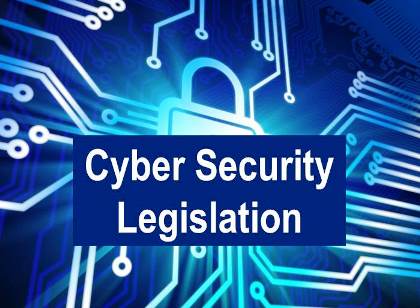Cyber Security Legislation: Latest Updates and News
Cybersecurity has become a top concern in our modern, digital world. With more online threats and attacks happening every day, governments worldwide are focusing on creating laws to protect people and businesses. This article will explore the latest updates in cybersecurity legislation and explain what these changes mean for everyone.
What Is Cybersecurity Legislation?
Cybersecurity legislation is a set of laws designed to protect systems, networks, and data from online attacks. These laws aim to prevent hackers from stealing sensitive information, such as credit card details, personal data, and company secrets. Governments create these laws to set rules for individuals, businesses, and organizations on how they should protect their data.
For example, laws might require companies to use strong passwords, encrypt their data, or report any data breaches to authorities. Cybersecurity laws also punish people who attempt to hack into systems or steal data. Punishments can range from fines to prison sentences, depending on the severity of the crime.
The goal of cybersecurity legislation is to create a safe and secure online environment. As technology changes, these laws also need to be updated regularly to keep up with new threats.
Recent Global Trends in Cybersecurity Legislation
Countries around the world are constantly updating their cybersecurity laws. In 2023, many nations passed new regulations to strengthen online safety. One key trend is the focus on critical infrastructure, such as energy, healthcare, and transportation. Governments are making sure that these essential sectors have strong cybersecurity measures in place to prevent attacks that could disrupt services.
Another trend is the increasing focus on personal data protection. With more people using online services like social media, banking, and shopping, the amount of personal data being shared online is huge. Laws like the General Data Protection Regulation (GDPR) in Europe and the California Consumer Privacy Act (CCPA) in the U.S. give individuals more control over how their data is collected and used.
In addition, more countries are implementing laws that require businesses to report data breaches quickly. This helps authorities react to incidents faster and reduce the damage caused by cyber-attacks. For example, in Australia, companies must report any breach that affects personal data within 72 hours.
These updates show that cybersecurity is now a global priority, with governments working together to create stronger defenses against cyber threats.
The Role of International Cooperation
Cyber threats often come from different countries, making international cooperation critical. Nations are now working together to combat cybercrime. For example, the European Union (EU) has partnered with the United States to develop stronger cybersecurity measures and share information about cyber threats.
International treaties, like the Budapest Convention on Cybercrime, encourage countries to work together to fight cybercrime. These treaties set rules for handling cybercriminals, investigating attacks, and sharing information between law enforcement agencies across borders.
Additionally, global organizations such as the United Nations (UN) are creating frameworks for countries to follow when developing their cybersecurity laws. This helps ensure that laws in different countries align and make it easier for them to cooperate.
International cooperation is vital because it allows governments to track cybercriminals, who often hide in different countries. Without these partnerships, it would be much harder to stop large-scale cyber-attacks that affect multiple nations.
How Cybersecurity Laws Impact Businesses

Businesses are directly affected by cybersecurity legislation. Companies must comply with laws that require them to protect customer data, secure their networks, and report any breaches. Failure to follow these laws can result in severe consequences, such as fines, lawsuits, or even losing the trust of customers.
For businesses, this means investing in cybersecurity tools and practices. They need to use encryption, install firewalls, and train employees on how to recognize phishing attacks. Many companies also hire cybersecurity experts to ensure they follow the latest regulations.
Cybersecurity laws also encourage businesses to be transparent about how they handle data. Customers now have the right to know what data is collected, how it is used, and who has access to it. This creates more trust between businesses and their customers, which is essential for maintaining long-term relationships.
As cyber threats evolve, businesses must stay updated on new legislation. By doing so, they can avoid legal trouble and keep their customers’ data safe.
The Future of Cybersecurity Legislation
The future of cybersecurity legislation will likely see even more strict regulations. Governments are expected to continue focusing on protecting critical infrastructure, personal data, and businesses. As new technologies like artificial intelligence (AI), the Internet of Things (IoT), and 5G networks grow, new laws will need to address the security risks they bring.
One area where we can expect more regulation is artificial intelligence. AI is increasingly being used in cybersecurity, but it can also be used by hackers to carry out attacks. Governments may introduce laws that regulate how AI is used in both offensive and defensive cyber operations.
The rise of connected devices through the Internet of Things will also require new laws. Many IoT devices, such as smart home systems and wearable tech, have weak security features, making them vulnerable to attacks. Future legislation may require manufacturers to build stronger security measures into these devices.
Finally, as the world becomes more dependent on digital services, we can expect more international cooperation in cybersecurity. Countries will continue to work together to create global standards and share information about cyber threats.
In conclusion, cybersecurity legislation is constantly evolving to meet the challenges of the digital age. Governments, businesses, and individuals all play a role in ensuring that our online world remains safe and secure.
Penalties and Enforcement in Cybersecurity Laws
Cybersecurity legislation includes strict penalties for individuals and organizations that fail to follow the rules. These penalties serve as a deterrent to prevent cybercrime and ensure that businesses take their cybersecurity responsibilities seriously. Governments enforce these laws to protect the public from online threats and hold offenders accountable.
The penalties for cybercrimes vary depending on the severity of the offense. In some cases, a person found guilty of hacking into a system or stealing sensitive data could face heavy fines and even jail time. For example, in the United States, violating the Computer Fraud and Abuse Act can result in prison sentences of up to 20 years for serious offenses.
For businesses, failing to comply with cybersecurity regulations can lead to substantial financial penalties. Companies that experience a data breach due to inadequate security measures can be fined millions of dollars. In addition to fines, businesses may face lawsuits from customers or partners who were affected by the breach. This can damage the company’s reputation and lead to long-term financial losses.
In addition to punishing cybercriminals, cybersecurity laws also include penalties for companies that fail to report breaches or do not take appropriate steps to secure their systems. For example, under the General Data Protection Regulation (GDPR) in Europe, companies can be fined up to 4% of their global annual revenue if they fail to protect customer data.
Governments also use enforcement measures to ensure that businesses comply with cybersecurity laws. This includes regular audits and inspections to check that companies are following the required security practices. Authorities may also issue warnings or orders for businesses to improve their cybersecurity if they find weaknesses during inspections.
While penalties are necessary to enforce cybersecurity laws, they also encourage companies to take proactive steps to protect their data and networks. By investing in cybersecurity measures, businesses can avoid legal trouble and maintain the trust of their customers.
The Impact of Cybersecurity Legislation on Individuals
Cybersecurity legislation doesn’t just affect businesses and governments; it also has a direct impact on individuals. These laws aim to protect people’s personal information, ensure their online safety, and give them more control over how their data is used.
One of the most significant ways cybersecurity laws benefit individuals is by giving them more control over their personal data. For example, the GDPR in Europe requires businesses to obtain explicit consent before collecting someone’s personal information. This means that people have the right to know what data is being collected, why it is being collected, and how it will be used. Individuals also have the right to request that their data be deleted if they no longer want a company to hold it.
In addition, cybersecurity legislation helps individuals by making businesses more accountable for data breaches. If a company suffers a breach that exposes personal data, they are required to inform the affected individuals promptly. This allows people to take steps to protect themselves, such as changing passwords or monitoring their financial accounts for suspicious activity.
For individuals who fall victim to cybercrimes, cybersecurity laws offer protection and legal recourse. Governments have created hotlines and support services for people who have experienced identity theft, online fraud, or other cybercrimes. Victims can report incidents to law enforcement and may receive assistance in recovering their lost data or financial assets.
Cybersecurity laws also protect individuals from harmful online activities such as cyberbullying and online harassment. Many countries have introduced legislation that makes it illegal to harass or threaten people online. These laws give victims the ability to report abuse and seek justice.
In conclusion, cybersecurity legislation is designed to protect individuals from the growing risks of the digital world. By giving people more control over their data and providing legal protections, these laws help create a safer online environment for everyone.
How to Stay Updated on Cybersecurity Legislation
As cybersecurity legislation continues to evolve, it is important to stay informed about the latest changes. Governments regularly introduce new laws, and businesses are required to comply with updated regulations. Keeping up with these changes is essential for individuals, businesses, and cybersecurity professionals.
One of the best ways to stay updated on cybersecurity legislation is to follow government announcements and news reports. Many governments have websites dedicated to cybersecurity, where they publish the latest laws, regulations, and updates. For example, in the United States, the Cybersecurity and Infrastructure Security Agency (CISA) provides resources on new policies and cyber threats.
Businesses can stay informed by joining industry groups and associations that focus on cybersecurity. These groups often provide members with regular updates on new laws and best practices for compliance. They also offer training programs and certifications to help businesses improve their cybersecurity.
Cybersecurity professionals can stay updated by attending conferences and events where experts discuss the latest trends in cyber law. These events provide opportunities to learn about new regulations and how they affect the industry. Many professionals also subscribe to cybersecurity journals and newsletters that provide insights into legislative changes.
For individuals, it’s helpful to sign up for email alerts from trusted sources that cover cybersecurity news. Many websites offer free updates on the latest cyber threats and legislation. Social media is another way to stay informed, as many cybersecurity experts and organizations share real-time updates on platforms like Twitter and LinkedIn.
Staying updated on cybersecurity legislation is crucial for everyone in today’s digital world. By understanding the latest laws and regulations, individuals and businesses can take steps to protect themselves from cyber threats and remain compliant with legal requirements.



